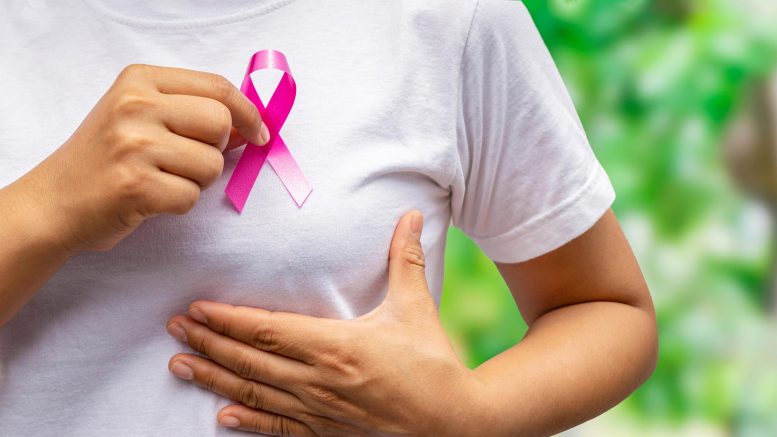
Researchers have discovered new genes associated with breast cancer, promising enhanced risk assessment and treatment insights, based on a study of over 240,000 women’s genetic data
A large-scale international collaborative study has identified new genes associated with breast cancer.
A groundbreaking international study led by Professor Jacques Simard from Université Laval and Professor Douglas Easton of the University of Cambridge, UK, has pinpointed new genes correlated with breast cancer. These findings could be integrated into future tests to identify women with heightened risk.
Present-day genetic tests for breast cancer predominantly factor in specific genes like BRCA1, BRCA2, and PALB2. However, these genes account for only a fraction of the genetic risk, indicating the likelihood of unidentified genes playing a role.
Unlocking New Insights
The research unveiled at least four new breast cancer risk genes and presented tentative evidence for several others. Recognizing these genes not only deepens our comprehension of breast cancer’s genetic risk but also enhances risk predictions. This refined understanding will foster more effective breast screening methods, risk mitigation, and clinical management strategies.
Furthermore, uncovering these novel genes offers invaluable insights into the biological processes that trigger cancer growth, potentially paving the way for innovative new treatments.
Improving Patient Care
The overarching objective is to integrate this information into an existing comprehensive risk assessment tool widely adopted by global healthcare experts. Professor Jacques Simard from Université Laval underscores, “Improving genetic counseling for high-risk women will promote shared decision-making regarding risk reduction strategies, screening, and determination of treatment options.”
“Although most of the variants identified in these new genes are rare, the risks can be significant for women who carry them. For example, alterations in one of the new genes, MAP3K1, appear to give rise to a particularly high risk of breast cancer,” adds Professor Simard, researcher at the Genomics Center of the CHU de Québec-Université Laval Research Center.
Robust Research Methods
The strength of the study lies in the genetic data that was used for the analysis. Genetic changes in all genes were looked at in 26,000 women with breast cancer and 217,000 women without breast cancer. These included women from eight countries in Europe and Asia.
“To our knowledge, this is the largest study of its kind. It was made possible through the use of data from multiple collaborators in many countries, as well as publicly available data from the UK Biobank,” says Professor Douglas Easton, Director of the Centre for Cancer Genetic Epidemiology of the University of Cambridge.
Before this information can be used in a clinical setting, scientists need to validate the results in further datasets. “We need additional data to determine more precisely the risks of cancer associated with variants in these genes, to study the characteristics of the tumors, and to understand how these genetic effects combine with other lifestyle factors affecting breast cancer risks,” says Professor Easton. The research team is currently pursuing a large-scale international effort designed for this purpose.
The study by Naomi Wilcox (University of Cambridge) et al. was published on August 17, 2023, in the scientific journal Nature Genetics.
Reference: “Exome sequencing identifies breast cancer susceptibility genes and defines the contribution of coding variants to breast cancer risk” by Naomi Wilcox, Martine Dumont, Anna González-Neira, Sara Carvalho, Charles Joly Beauparlant, Marco Crotti, Craig Luccarini, Penny Soucy, Stéphane Dubois, Rocio Nuñez-Torres, Guillermo Pita, Eugene J. Gardner, Joe Dennis, M. Rosario Alonso, Nuria Álvarez, Caroline Baynes, Annie Claude Collin-Deschesnes, Sylvie Desjardins, Heiko Becher, Sabine Behrens, Manjeet K. Bolla, Jose E. Castelao, Jenny Chang-Claude, Sten Cornelissen, Thilo Dörk, Christoph Engel, Manuela Gago-Dominguez, Pascal Guénel, Andreas Hadjisavvas, Eric Hahnen, Mikael Hartman, Belén Herráez, SGBCC Investigators, Audrey Jung, Renske Keeman, Marion Kiechle, Jingmei Li, Maria A. Loizidou, Michael Lush, Kyriaki Michailidou, Mihalis I. Panayiotidis, Xueling Sim, Soo Hwang Teo, Jonathan P. Tyrer, Lizet E. van der Kolk, Cecilia Wahlström, Qin Wang, John R.B. Perry, Javier Benitez, Marjanka K. Schmidt, Rita K. Schmutzler, Paul D. P. Pharoah, Arnaud Droit, Alison M. Dunning, Anders Kvist, Peter Devilee, Douglas F. Easton and Jacques Simard, 17 August 2023, Nature Genetics.
DOI: 10.1038/s41588-023-01466-z
The study was jointly supervised by Professors Jacques Simard and Douglas Easton.
This study was funded by the Government of Canada through Genome Canada and the Canadian Institutes of Health Research, the Ministère de l’Économie et de l’Innovation du Québec through Genome Québec, the Quebec Breast Cancer Foundation, the European Union Horizon program, the Wellcome Trust as well as the International Alliance for Cancer Early Detection, an alliance between Cancer Research UK, the Canary Center at Stanford University, the University of Cambridge, OHSU Knight Cancer Institute, University College London and the University of Manchester.

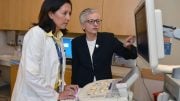
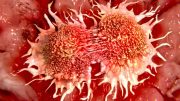
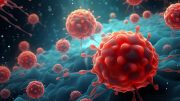
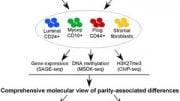

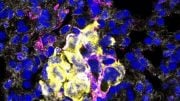
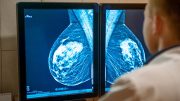

Be the first to comment on "Unraveling the Genetic Code: New Suspects in Breast Cancer Identified"